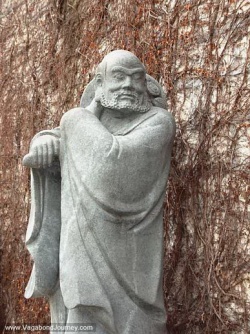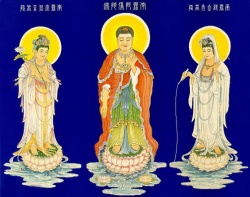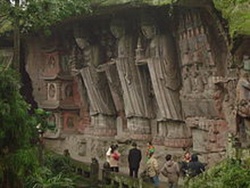Ayacana Sutta
1. Ayacana Sutta - The good monk, if he would perfectly aspire, should wish to be like Sariputta and Moggallana ; the nun to be like Khema and Uppalavanna; the householder like Citta and Hatthaka; the house mistress like Khujjuttara and Velukantaki, the mother of Nanda. A.ii.164.
2. Ayacana Sutta - Contains the story of the reluctance felt by the Buddha, while meditating at Uruvela, in the eighth week after the Enlightenment, to preach his doctrine to the world, feeling that it would not appeal to the human temperament; and of the appearance before him, of the Brahma Sahampati, who had read his thoughts and who entreated him to overcome this reluctance. He assured the Buddha that there were in the world many who would comprehend the Dhamma if they heard it. The Buddha saw that this assurance was justified and agreed to set forth as a teacher (S.i.136ff).
The sutta appears verbatim in the Vinaya (i.4ff) and almost verbatim in the Digha Nikaya (ii.36ff), as an episode in the life of each of the Buddhas mentioned there, but with two variants; the Brahma repeats his request three times and the stanzas in which the request is made, as given in the Samyutta, are omitted.
4. ßRadha, whatever is of the nature of ceasing you should dispel interest for it. You should dispel greed for it. You should dispel interest and greed for it.
Radha, what things are of the nature of ceasing? Radha, matter is of the nature of ceasing. You should dispel interest for it. Radha, feelings, perceptions, intentions, and consciousness are of the nature of ceasing. You should dispel interest for them.
5. ßRadha, you should dispel interest for ceasing things. ... re ... You should dispel greed for ceasing things. You should dispel interest and greed for ceasing things.
Ayacana Sutta
Brahma Sahampati's Request
I have heard that on one occasion, when the Blessed One was newly Self-awakened, he was staying at Uruvela on the bank of the Nerañjara River, at the foot of the Goatherd's Banyan Tree. Then, while he was alone and in seclusion, this line of thinking arose in his awareness: "This Dhamma that I have attained is deep, hard to see, hard to realize, peaceful, refined, beyond the scope of conjecture, subtle, to-be-experienced by the wise. But this generation delights in attachment, is excited by attachment, enjoys attachment. For a generation delighting in attachment, excited by attachment, enjoying attachment, this/that conditionality and dependent co-arising are hard to see. This state, too, is hard to see: the resolution of all fabrications, the relinquishment of all acquisitions, the ending of craving; dispassion; cessation; Unbinding. And if I were to teach the Dhamma and if others would not understand me, that would be tiresome for me, troublesome for me."
Just then these verses, unspoken in the past, unheard before, occurred to the Blessed One:
Enough now with teaching
what
only with difficulty
I reached.
This Dhamma is not easily realized
by those overcome
with aversion and passion.
What is abstruse, subtle,
deep,
hard to see,
going against the flow --
those delighting in passion,
cloaked in the mass of darkness,
won’t see.
As the Blessed One reflected thus, his mind inclined to dwelling at ease, not to teaching the Dhamma.
Then Brahma Sahampati, having known with his own awareness the line of thinking in the Blessed One's awareness, thought: "The world is lost! The world is destroyed! The mind of the Tathágata, the Arahant, the Rightly Self-awakened One inclines to dwelling at ease, not to teaching the Dhamma!" Then, just as a strong man might extend his flexed arm or flex his extended arm, Brahma Sahampati disappeared from the Brahma-world and reappeared in front the Blessed One. Arranging his upper robe over one shoulder, he knelt down with his right knee on the ground, saluted the Blessed One with his hands before his heart, and said to him: "Lord, let the Blessed One teach the Dhamma! Let the One-Well-Gone teach the Dhamma! There are beings with little dust in their eyes who are falling away because they do not hear the Dhamma. There will be those who will understand the Dhamma."
That is what Brahma Sahampati said. Having said that, he further said this:
In the past
there appeared among the Magadhans
an impure Dhamma
devised by the stained.
Throw open the door to the Deathless!
Let them hear the Dhamma
realized by the Stainless One!
Just as one standing on a rocky crag
might see people
all around below,
So, O wise one, with all-around vision,
ascend the palace
fashioned of the Dhamma.
Free from sorrow, behold the people
submerged in sorrow,
oppressed by birth and aging.
Rise up, hero, victor in battle!
O Teacher, wander without debt in the world.
Teach the Dhamma, O Blessed One:
There will be those who will understand.
Then the Blessed One, having understood Brahma's invitation, out of compassion for beings, surveyed the world with the eye of an Awakened One. As he did so, he saw beings with little dust in their eyes and those with much, those with keen faculties and those with dull, those with good attributes and those with bad, those easy to teach and those hard, some of them seeing disgrace and danger in the other world. Just as in a pond of blue or red or white lotuses, some lotuses -- born and growing in the water -- might flourish while immersed in the water, without rising up from the water; some might stand at an even level with the water; while some might rise up from the water and stand without being smeared by the water -- so too, surveying the world with the eye of an Awakened One, the Blessed One saw beings with little dust in their eyes and those with much, those with keen faculties and those with dull, those with good attributes and those with bad, those easy to teach and those hard, some of them seeing disgrace and danger in the other world.
Having seen this, he answered Brahma Sahampati in verse:
Open are the doors to the Deathless
to those with ears.
Let them show their conviction.
Perceiving trouble, O Brahma,
I did not tell people the refined,
sublime Dhamma.
Then Brahma Sahampati, thinking, "The Blessed One has given his consent to teach of Dhamma," bowed down to the Blessed One and, circling him on the right, disappeared right there.




